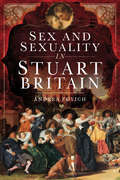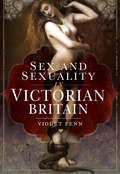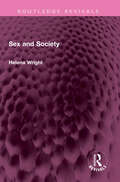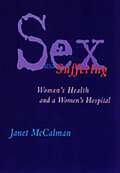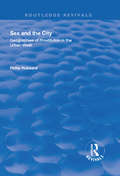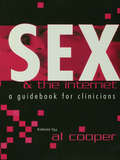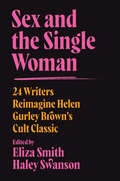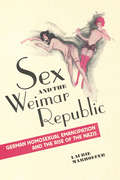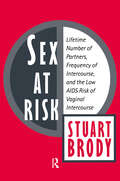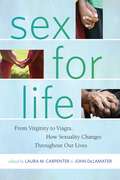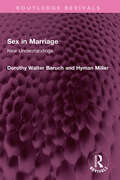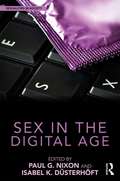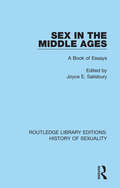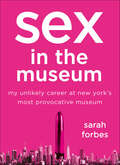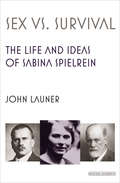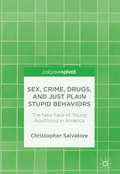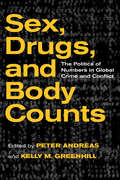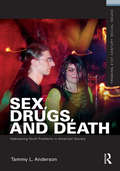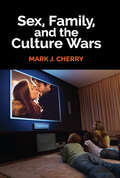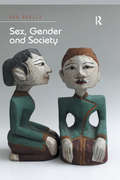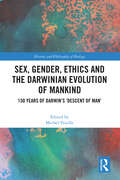- Table View
- List View
Sex and Sexuality in Stuart Britain
by Andrea ZuvichAn expert in Stuart England examines the sexual lives of Britons in the seventeenth and early eighteenth centuries in this frank, informative, and revealing history.Acclaimed Stuart historian Andrea Zuvich explores the sexual mores of Stuart Britain, including surprising beliefs, bizarre practices, and ingenious solutions for infertility, impotence, sexually transmitted diseases, and more. Along the way, she reveals much about the prevailing attitudes towards male and female sexual behavior.Zuvich sheds light not only on the saucy love lives of the Royal Stuarts, but also on the dark underbelly of the Stuart era with histories of prostitution, sexual violence, infanticide, and sexual deviance. She looks at everything from what was considered sexually attractive to the penalties for adultery, incest, and fornication.Sex and Sexuality in Stuart Britain touches on the fashion, food, science, art, medicine, magic, literature, love, politics, faith and superstition of the day.
Sex and Sexuality in Victorian Britain
by Violet Fenn&“Dull this book is not, and it gives an insight into the many scandals not spoken about in polite Victorian drawing rooms.&” —Glasgow & West of Scotland Family History Society Peek beneath the bedsheets of nineteenth-century Britain in this affectionate, informative and fascinating look at sex and sexuality during the reign of Queen Victoria. It examines the prevailing attitudes towards male and female sexual behavior, and the ways in which these attitudes were often determined by those in positions of power and authority. It also explores our ancestors&’ ingenious, surprising, bizarre and often entertaining solutions to the challenges associated with maintaining a healthy sex life. Did the people in Victorian times live up to their stereotypes when it came to sexual behavior? This book will answer this question, as well as looking at fashion, food, science, art, medicine, magic, literature, love, politics, faith and superstition through a new lens, leaving the reader uplifted and with a new regard for the ingenuity and character of our great-great-grandparents. &“I would say this book gives you the information on relationships, genders and very much behavior that doesn&’t usually come across in history books. Therefore this is an excellent book indeed, certainly one that more people should be aware of and learn from.&” —UK Historian &“The writing is joyous and it is clear the author enjoys her subject and is fairly knowledgeable on things Victorian.&” —Rosie Writes &“Fenn&’s writing is so readable and it&’s clear this is a book written by a historian who loves her subject and is very knowledgeable about the research being carried out by other historians.&” —Jessticulates
Sex and Sexuality in Victorian Britain
by Violet Fenn&“Dull this book is not, and it gives an insight into the many scandals not spoken about in polite Victorian drawing rooms.&” —Glasgow & West of Scotland Family History Society Peek beneath the bedsheets of nineteenth-century Britain in this affectionate, informative and fascinating look at sex and sexuality during the reign of Queen Victoria. It examines the prevailing attitudes towards male and female sexual behavior, and the ways in which these attitudes were often determined by those in positions of power and authority. It also explores our ancestors&’ ingenious, surprising, bizarre and often entertaining solutions to the challenges associated with maintaining a healthy sex life. Did the people in Victorian times live up to their stereotypes when it came to sexual behavior? This book will answer this question, as well as looking at fashion, food, science, art, medicine, magic, literature, love, politics, faith and superstition through a new lens, leaving the reader uplifted and with a new regard for the ingenuity and character of our great-great-grandparents. &“I would say this book gives you the information on relationships, genders and very much behavior that doesn&’t usually come across in history books. Therefore this is an excellent book indeed, certainly one that more people should be aware of and learn from.&” —UK Historian &“The writing is joyous and it is clear the author enjoys her subject and is fairly knowledgeable on things Victorian.&” —Rosie Writes &“Fenn&’s writing is so readable and it&’s clear this is a book written by a historian who loves her subject and is very knowledgeable about the research being carried out by other historians.&” —Jessticulates
Sex and Society (Routledge Revivals)
by Helena WrightFirst published in 1968, Sex and Society presents and analyses the code of sexual behaviour based on the universal use of contraceptive methods. It includes discussion of all forms of sexual activity, and emphasises in particular the attitudes that should be adopted in sex education. Backed up by case histories, and including details of reforms in abortion and homosexual law, this book sheds light on a topic which continues to cause concern in modern times. The author had been in active contact with all kinds of sexual problems for over thirty years in her professional clinic practice, and in her travels in India, Poland and Denmark teaching contraceptive techniques to doctors and nurses. Her experience as a Founder Member of the International Planned Parenthood Federation and participation in all the International and Regional Conferences gave her a very wide knowledge of sexual and social problems throughout the world. This book will be of interest to students of medicine, sexuality studies, psychology, gender studies, and health.
Sex and Suffering: Women's Health and a Women's Hospital
by Janet McCalmanSex and Suffering is a ground-breaking work. It tells the often shocking story of women's desperation to gain control over their lives and their health, and of medicine's struggle to comprehend and manage the mysteries of nature. It offers a graphic and revealing history of childbirth in Australia; of the medical care of women; of nursing and gender roles; and of the impact of immigration on Australian society. Remarkably, thousands of detailed case notes, from the 1850s to the 1930s, survived intact at the Royal Women's Hospital, Melbourne. For the first time in the English-speaking world a historian was allowed to work directly from these confidential patient records. Janet McCalman vividly recreates the lives of patients and the daily work of a hospital. She enables readers to follow the institution through times of growth and economic depression, through the grim history of criminal abortion, and through the inspiring story of medical science and surgery since the coming of anaesthesia. Sex and Suffering is a vivid and absorbing social history of women's health, seen through the work of Australia's oldest women's hospital.
Sex and the City: Geographies of Prostitution in the Urban West (Routledge Revivals)
by Philip HubbardThis title was first published in 2000: Prostitution has always played a crucial symbolic role in the definition of moral and sexual standards and, as such, the figure of the prostitute has been paradigmatic in the history of the sex and the city. Focusing on the geographies of female prostitution in Western societies, this book explores the nature of sites of sex work and the ways they shape the lives of prostitutes (and their clients). In so doing, the book aims not simply to present a static "mapping" of sex work, but seeks to highlight how these public and private ssites are struggled over, with prostitutes often resisting the strategies of social and legal control designed to regulate their working practices. The book consequently engages with a number of contemporary debates in social, cultural and gender geography surrounding the importance of public and private spaces in producing (and reproducing) gender, sex and bodily identities.
Sex and the Family in Colonial India: The Making of Empire
by Durba GhoshIn the early years of the British empire, cohabitation between Indian women and British men was commonplace and to some degree tolerated. However, as Durba Ghosh argues in a challenge to the existing historiography, anxieties about social status, appropriate sexuality, and the question of who could be counted as 'British' or 'Indian' were constant concerns of the colonial government even at this time. By following the stories of a number of mixed-race families, at all levels of the social scale, from high-ranking officials and noblewomen to rank-and-file soldiers and camp followers, and also the activities of indigenous female concubines, mistresses and wives, the author offers a fascinating account of how gender, class and race affected the cultural, social and even political mores of the period. The book makes an original and signal contribution to scholarship on colonialism, gender and sexuality.
Sex and the Internet: A Guide Book for Clinicians
by Al CooperFirst Published in 2002. Routledge is an imprint of Taylor & Francis, an informa company.
Sex and the Single Woman: 24 Writers Reimagine Helen Gurley Brown's Cult Classic
by Haley Swanson Eliza SmithOne of Bustle's Best Books of MayA feminist anthology inspired by legendary Cosmopolitan editor Helen Gurley Brown’s Sex and the Single Girl, featuring twenty-four new essays on the triumphs and heartbreaks of modern singlehood from acclaimed and bestselling authors, including Kristen Arnett, Morgan Parker, Evette Dionne, and Melissa Febos.Sixty years ago, Helen Gurley Brown's Sex and the Single Girl sent shockwaves through the United States, selling more than two million copies in three weeks. Helen’s message was radical for its time: marriage wasn’t essential for women to lead rich, fulfilling lives.Now, in these critical, wry, and expansive essays, twenty-four writers reconsider Helen’s advice and how it applies to their own paths, fielding topics that she couldn’t—or wouldn’t—conceive of in 1962: contraception and abortion (an omission demanded by her publisher), queer and trans womanhood, polyamory, celibacy, interracial dating, bodies of all kinds, consent, sex work, IVF, and the pop culture that both saves and fails us.Eliza Smith and Haley Swanson’s revisionist anthology honors Brown’s irreverent spirit while also validating our modern experiences of singlehood, encouraging us all to reclaim joy where it’s so often been denied.
Sex and the Weimar Republic
by Laurie MarhoeferLiberated, licentious, or merely liberal, the sexual freedoms of Germany's Weimar Republic have become legendary. The home of the world's first gay rights movement, the republic embodied a progressive, secular vision of sexual liberation. Immortalized - however misleadingly - in Christopher Isherwood's Berlin Stories and the musical Cabaret, Weimar's freedoms have become a touchstone for the politics of sexual emancipation.Yet, as Laurie Marhoefer shows in Sex and Weimar Republic, those sexual freedoms were only obtained at the expense of a minority who were deemed sexually disordered. In Weimar Germany, the citizen's right to sexual freedom came with a duty to keep sexuality private, non-commercial, and respectable.Sex and the Weimar Republic examines the rise of sexual tolerance through the debates which surrounded "immoral" sexuality: obscenity, male homosexuality, lesbianism, transgender identity, heterosexual promiscuity, and prostitution. It follows the sexual politics of a swath of Weimar society ranging from sexologist Magnus Hirschfeld to Nazi stormtrooper Ernst Röhm. Tracing the connections between toleration and regulation, Marhoefer's observations remain relevant to the politics of sexuality today.
Sex at Risk: Lifetime Number of Partners, Frequency of Intercourse and the Low AIDS Risk of Vaginal Intercourse
by Stuart BrodyPoliticians, interest groups, and the mass media often answer questions about how AIDS is sexually transmitted as if heterosexual vaginal intercourse is a high-risk activity. When it comes to understanding how AIDS is transmitted, and formulating effective policy to deal with the spread of AIDS, America remains confused. What. Brody calls ideological knowledge about AIDS is fat more likely to filter through society than scientific knowledge.Sex at Risk Is a comprehensive review of the scientific literature dealing with. the transmission of AIDS. Like Michael Fumento's The Myth of Heterosexual AIDS, it exposes the mythology surrounding vaginal intercourse and AIDS transmission, Brody also looks deeply at reasons that fear of AIDS transmission from vaginal intercourse has spread so widely and profoundly, He addresses serious methodological problems in AIDS/HIV behavioral research, as well as tendentious political correctness that has done a disservice to science.Sex at Risk also comprehensively reviews the international research literature on correlates of lifetime number of sexual partners and frequency of sexual intercourse. Among topics covered are: relationships between lifetime number of sexual partners and mental health, explanations for important differences between intercourse and masturbation, the possible association of frequency with healthy functioning, and correlations between frequency and national development.Brody concludes by discussing what AIDS reveals about how politically correct thought impedes scientific progress, when taboo themes, regardless of their validity, cannot be pursued, Sex at Risk is factually grounded, yet controversial; . Brody raises critical questions about much of what we have learned about AIDS from popular and professional publications, "soft scientists," and public health campaigns. It will be of interest to medical doctors, clinicians, and those interested in the sociology and psychology of knowledge,
Sex for Life: From Virginity to Viagra, How Sexuality Changes Throughout Our Lives (Intersections #10)
by John DeLamater Laura M. CarpenterSexual beliefs, behaviors and identities are interwoven throughout our lives, from childhood to old age. An edited collection of original empirical contributions united through its use of a distinctive, cutting-edge theoretical framework, Sex for Life critically examines sexuality across the entire lifespan. Rooted in diverse disciplines and employing a wide range of research methods, the chapters explore the sexual and social transitions that typically map to broad life stages, as well as key age-graded physiological transitions, such as puberty and menopause, while drawing on the latest developments in gender, sexuality, and life course studies.Sex for Life explores a wide variety of topics, including puberty, sexual initiation, coming out, sexual assault, marriage/life partnering, disability onset, immigration, divorce, menopause, and widowhood, always attending to the social locations – including gender, race, ethnicity, and social class – that shape, and are shaped by, sexuality. The empirical work collected in Sex for Life ultimately speaks to important public policy issues, such as sex education, aging societies, and the increasing politicization of scientific research. Accessibly written, the contributions capture the interplay between individual lives and the ever-changing social-historical context, facilitating new insight not only into people’s sexual lives, but also into ways of studying them, ultimately providing a fresh, new perspective on sexuality.
Sex in Marriage: New Understandings (Routledge Revivals)
by Dorothy Walter Baruch Hyman MillerFirst Published in 1963, Sex in Marriage presents down to earth, practical guidance on the emotional and physical aspects of life, love and marriage. The authors both experienced psychotherapists, have felt that a new approach was needed. The book explains in a straightforward and thorough manner the sources of satisfaction and the roots of discontent that lie beneath the surface of any marriage. It traces marriage from the beginning, through its middle years and into its older stages, including considerations that are concrete and practical but still have a fundamental and sound emotional base. The book illustrates how attitudes in sex and marriage go back to childhood and how early experiences, though forgotten, can still exercise important influences. In helping to alleviate old guilts and anxieties, the book makes an essential contribution. This is an interesting read for sociologists, psychologists and for general readers.
Sex in the Digital Age (Sexualities in Society)
by Paul G Nixon Isabel K. DüsterhöftShifts in societal development resulting from economic and technological advancements have had an impact upon the development of human sexuality and behaviour, and with the expansion of developments such as the Internet and associated technologies, it is likely that further societal shifts will ensue. This book recognises the importance of new digital spaces for discourses surrounding sexuality, examining issues such as pornography; sex education and health; LGBTQ sexualities; polysexuality or polyamory; abstention; sexual abuse and violence; erotic online literature; sex therapy; teledildonics; sex and gaming; online dating; celebrity porn; young people and sexual media; and sexting and sextainment, all of which are prominently affected by the use of digital media. With case studies drawn from the US, the UK and Europe, Sex in the Digital Age engages in discussion about the changing acceptance of sex in the 21st century and part played in that by digital media, and considers the future of sex and sexuality in an increasingly digital age. It will therefore appear to scholars across the social sciences with interests in gender and sexuality, new technologies and media and cultural studies.
Sex in the Heartland
by Beth BaileySex in the Heartland is the story of the sexual revolution in a small university town in the quintessential heartland state of Kansas. Bypassing the oft-told tales of radicals and revolutionaries on either coast, Beth Bailey argues that the revolution was forged in towns and cities alike, as "ordinary" people struggled over the boundaries of public and private sexual behavior in postwar America. Bailey fundamentally challenges contemporary perceptions of the revolution as simply a triumph of free love and gay lib. Rather, she explores the long-term and mainstream changes in American society, beginning in the economic and social dislocations of World War II and the explosion of mass media and communication, which aided and abetted the sexual upheaval of the 1960s. Focusing on Lawrence, Kansas, we discover the intricacies and depth of a transformation that was nurtured at the grass roots. Americans used the concept of revolution to make sense of social and sexual changes as they lived through them. Everything from the birth control pill and counterculture to Civil Rights, was conflated into "the revolution," an accessible but deceptive simplification, too easy to both glorify and vilify. Bailey untangles the radically different origins, intentions, and outcomes of these events to help us understand their roles and meanings for sex in contemporary America. She argues that the sexual revolution challenged and partially overturned a system of sexual controls based on oppression, inequality, and exploitation, and created new models of sex and gender relations that have shaped our society in powerful and positive ways.
Sex in the Middle Ages: A Book of Essays (Routledge Library Editions: History of Sexuality #7)
by Joyce E. SalisburyOriginally published in 1991. Covering courtship, disclosure, diversity, and public implications, the essays here discuss topics such as erotic magic, nakedness, physicians’ attitudes about sex, boy-love, saints and sex, and the politics of sodomy, as they were manifested in medieval Europe and the Middle East.
Sex in the Museum: My Unlikely Career at New York's Most Provocative Museum
by Sarah ForbesSarah Forbes was in graduate school when she stumbled upon a museum dedicated to . . . sex. The anthropology student hesitated when her boyfriend suggested she apply for a job, but apply she did, and it wasn’t long before a part-time position at New York’s MUSEUM OF SEX lead to a gig as the museum's curator. That was over twelve years ago. Now Sarah—a married mother of two—proudly sports her title as Curator of Sex. In SEX IN THE MUSEUM, Sarah invites readers to travel from suburban garages where men and women build sex machines, to factories that make sex toys, to labyrinthine archives of erotica collectors. Escorting us in to the hidden world of sex, illuminating the never-talked-about communities and eccentricities of our sexual subcultures, and telling her own personal story of a decade at The Museum of Sex, Sarah asks readers to grapple with the same questions she did: when it comes to sex, what is good, bad, deviant, normal? Do such terms even apply? If everyone has sexual secrets, is it possible to really know another person and be known by them? And importantly, in our hyper-sexualized world, is it still possible to fall in love?
Sex vs. Survival: The Life and Ideas of Sabina Spielrein
by John Launer&“An impressively researched, documented, and readable biography&” of a woman who played a key role in the history of psychology (Library Journal, starred review). Who was Sabina Spielrein? She is probably best known for her notorious affair with Carl Jung, which was dramatized in the film A Dangerous Method, starring Keira Knightley. Yet her life story is much more compelling than just one famous relationship. Spielrein overcame family and psychological abuse to become a profoundly original thinker in her own right. Sex vs. Survival is the first biography to put her life and ideas at the center of the story and examine Spielrein&’s key role in the development of psychoanalysis. Drawing on fresh research into Spielrein&’s diaries, papers, and correspondence, John Launer shows how Spielrein&’s overlooked ideas―rejected by Freud and Jung but substantially vindicated by later developments in psychology and evolutionary biology—may represent the last and most important stage in the rediscovery of an extraordinary life. &“An invaluable resource for understanding Spielrein&’s significance, her progressive thinking, and her groundbreaking contributions to the history of psychoanalysis.&” —Publishers Weekly &“By the end of Launer&’s account, there&’s no mistaking what the founding fathers of analysis did to this particular founding mother—and probably to many other women. At least this biography offers Spielrein some retrospective justice.&” —Jewish Book World
Sex, Crime, Drugs, and Just Plain Stupid Behaviors: The New Face of Young Adulthood in America
by Christopher SalvatoreSex, Crime, Drugs, and Just Plain Stupid Behaviors: The New Face of Young Adulthood in America is written for students, parents, and practitioners to provide insight into how emerging adulthood impacts the lives and behaviors of young people. Salvatore provides an insightful examination of the evolution of emerging adulthood as a distinct stage of the life course, bridging the gap between macro-level social forces and micro-level life experiences and behavior. Chapters discuss the influence of social institutions such as marriage, the family, religion, and parenting on behavior during emerging adulthood. Exploration and sensation-seeking are examined in relation to the behaviors and identity of emerging adults alongside issues such as criminal offending, substance use, and other risky/dangerous behaviors. Finally, the book concludes with informed policy recommendations for social institutions such as educational establishments and the criminal justice system on how to work with emerging adults.
Sex, Drugs, and Body Counts: The Politics of Numbers in Global Crime and Conflict
by Peter Andreas Kelly M. GreenhillAt least 200,000-250,000 people died in the war in Bosnia. "There are three million child soldiers in Africa." "More than 650,000 civilians have been killed as a result of the U.S. occupation of Iraq." "Between 600,000 and 800,000 women are trafficked across borders every year." "Money laundering represents as much as 10 percent of global GDP." "Internet child porn is a $20 billion-a-year industry." These are big, attention-grabbing numbers, frequently used in policy debates and media reporting. Peter Andreas and Kelly M. Greenhill see only one problem: these numbers are probably false. Their continued use and abuse reflect a much larger and troubling pattern: policymakers and the media naively or deliberately accept highly politicized and questionable statistical claims about activities that are extremely difficult to measure. As a result, we too often become trapped by these mythical numbers, with perverse and counterproductive consequences.This problem exists in myriad policy realms. But it is particularly pronounced in statistics related to the politically charged realms of global crime and conflict-numbers of people killed in massacres and during genocides, the size of refugee flows, the magnitude of the illicit global trade in drugs and human beings, and so on. In Sex, Drugs, and Body Counts, political scientists, anthropologists, sociologists, and policy analysts critically examine the murky origins of some of these statistics and trace their remarkable proliferation. They also assess the standard metrics used to evaluate policy effectiveness in combating problems such as terrorist financing, sex trafficking, and the drug trade.
Sex, Drugs, and Death: Addressing Youth Problems in American Society (Framing 21st Century Social Issues)
by Tammy L. AndersonSex, Drugs, and Death: Addressing Youth Problems in American Society explores how youth lifestyles, identity pursuits, behaviors and activities produce a wide range of social problems in contemporary society. The book focuses on the interconnections between three of the most significant youth issues: sexuality, substance use and suicide. The book pays special attention to the unique pursuits of young people and the locations in which they interact, including virtual places like Facebook and more actual ones such as high school, college, and nightclubs. Patterns among females and males of various class, race, and ethnic backgrounds are also featured prominently in the text as well as how sociologists think about and study them. The goal of this new, unique Series is to offer readable, teachable "thinking frames" on today’s social problems and social issues by leading scholars, all in short sixty page or shorter formats, and available for view on http://routledge.customgateway.com/routledge-social-issues.html. For instructors teaching a wide range of courses in the social sciences, the Routledge Social Issues Collection now offers the best of both worlds: originally written short texts that provide "overviews" to important social issues as well as teachable excerpts from larger works previously published by Routledge and other presses.
Sex, Family, and the Culture Wars
by Mark J. CherryExtraordinary social and moral shifts have taken place in Western societies. Sex is no longer the exclusive province of husband and wife set within monogamous married family life. The world is awash in sex: advertising, books, magazines, movies, sex clubs, internet pornography, etc. Parents, traditionally responsible for guiding their children's moral and social development, have been effectively side-lined by commercial and governmental interests.This volume pursues a detailed study of how changes in social life dating from the sexual revolution of the 1960s have affected the family. Cherry shows that attempts to redefine the family away from the marital union of husband and wife come with real costs: social, emotional, psychological, and financial. He argues that while political campaigns have fuelled attempts to undermine the traditional family, to pretend it possesses no basic biological, social, or moral reality, such ideologically driven undertakings are injurious to society.Acting as if there are no consequential differences between traditional marriage and other sexual lifestyles ignores significant data demonstrating the importance of the traditional biological family to the well-being of men and women, and the successful raising of children. The family possesses a biological and moral being that is foundational; an essential building block of society. Cherry argues that the family is the most incontrovertible field of conflict in the culture wars; others might conclude that it is the decisive battleground.
Sex, Freedom, and Power in Imperial Germany, 1880-1914
by Edward Ross DickinsonThis is a study of the intense, complex, and escalating debate over sexuality and sexual morality that roiled politics in Germany between 1880 and 1914. That debate was grounded in the rapid evolution and growing complexity of German society - the multiplication of cultural groupings, professional associations, and social movements; the emergence of new social groups, social milieus, and professions; the rapid development of the media and commercial entertainments; and so on. All parties involved understood it to be a debate over the most fundamental question of modern political life: how to secure both national power and individual freedom in the context of rapid social and cultural change.
Sex, Gender and Society
by Ann OakleyWhat are the differences between the sexes? That is the question that Ann Oakley set out to answer in this pioneering study, now established as a classic in the field. To answer it she draws on the evidence of biology, anthropology, sociology and the study of animal behaviour to cut through popular myths and reach the underlying truth. She demonstrates conclusively that men and women are not two separate groups: rather each individual takes his or her place on a continuous scale. She shows how different societies define masculinity and femininity in different and even opposite ways, and discusses how far observable differences are based on biology and psychology and how far on cultural conditioning. Many books have discussed these vital issues. None, however, have drawn on such an impressively wide range of evidence or discussed it with such clarity and authority. Now newly reissued with a substantial introduction which highlights its continuing relevance, this work will continue to inform and shape dialogues around sex and gender for a new generation of scholars and students.
Sex, Gender, Ethics and the Darwinian Evolution of Mankind: 150 years of Darwin’s ‘Descent of Man’ (History and Philosophy of Biology)
by Michel VeuilleSex, Gender, Ethics and the Darwinian Evolution of Mankind examines the impact of Darwin’s Descent of Man on contemporary biology and the humanities.Its publication in 1871 was a founding event in anthropology. Its content was primarily concerned with the development of sexual life, social life and intellectual life, not only as outcomes of evolution, but as components that have actively intermixed over time with the evolutionary mechanism of natural selection. The stamp of Darwinism on modern thought is still very important and brings novelties to academic studies. Several fields influenced by Darwinian anthropology developed in recent decades, including evolutionary ethics, the evolution of sociality and sexual communication in animal and plant species. Sociobiology and evolutionary psychology are topics that draw heavily on Darwin’s Descent of Man. The understanding of Darwin’s thought has also progressed greatly in recent decades, following the systematic study of Darwin’s correspondence and notebooks, leading to a reassessment of the development of his thought on humans, social groups and heredity, and how they come together in his theory of evolution.The book combines a historical perspective on Darwin’s achievement and his legacy. It will be of interest to students and scholars in a variety of fields, from experimental biology to the social and historical sciences.
